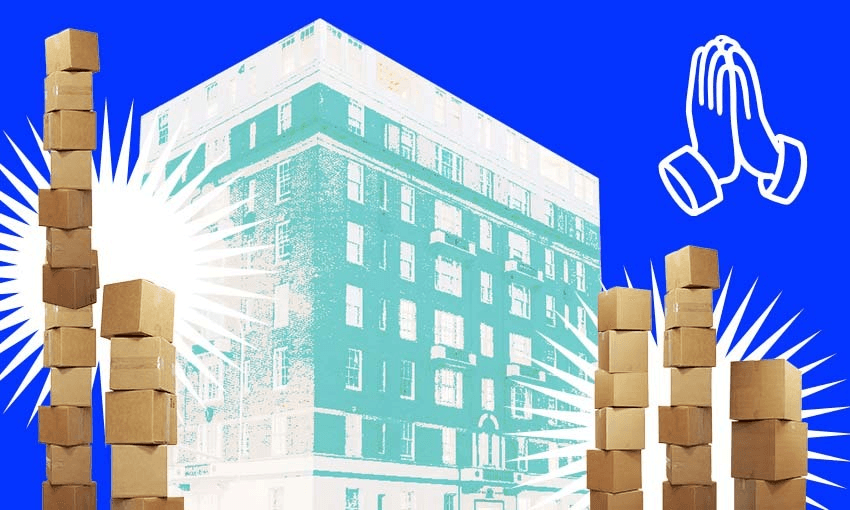Sam Brooks reflects on the end of lockdown, and what it all meant.
For most of lockdown, my main companion was boxes. I moved house about a month into lockdown, and the process of removing those boxes, slowly and methodically, from my apartment into the too-small rubbish and recycling bins has been an unnecessarily arduous one.
It also seemed that as I moved boxes out, more simply came in to replace them. I bought things that came in large, cumbersome boxes – an air fryer, a countertop dishwasher, a vacuum – that would require cutting up and breaking down. Eventually, I stopped moving boxes out.
What was the point? Nobody was there to see them. Only I had to live with them. I learned to weave in between these boxes. They weren’t a forever thing, of course. They’d leave when lockdown was over.
Throughout lockdown, especially in those last few weeks, when there was a clear finish line, I ended a lot of thoughts with “… when lockdown is over”. When lockdown is over, the sun will come out, little birds will do my skincare routine for me, and I’ll have a crystal clear soprano belt.
Then came December 3. The boxes were still there. The sun was out, but the only birds in my apartment were feral interlopers, and my voice remained an instrument not suited for singing.
Nothing had changed.
There’s a human need, or at least tendency, to craft our experiences into stories. Beginning, middle, end. Climaxes, twists, turns. We experience so much of the world in this way that we can begin to believe that our lives follow the roadmaps laid out by stories. That’s not true. We reverse-engineer our lives to fit into stories; lives become stories only in the retelling of them, not the living.
We’re trained, through years of consuming stories, whether in books or onscreen or in music, to treat life as a series of chapters or episodes. It’s how we learn to comprehend so many things that make up the world, whether it’s the speed of trains hurtling across the countryside or the unfathomable weight of grief. The word “closure”, for example, makes sense from a narrative standpoint, not from an actual human life lived standpoint. People don’t get closure, they just stop thinking about something.
If you were writing a satisfying story about these last few months of the pandemic, the end of lockdown should represent a big shift in the protagonist’s life. It might come with a realisation that they hadn’t appreciated something or someone in their life, and now they had the opportunity to right that wrong. They might learn something, or do something to represent their change in circumstance.
If you were writing a bleak story, they would learn nothing at all. They would not change. They would continue to live life as though August 17 had slipped straight into December 3, with nothing lost or gained in between. I imagine there are a few people who feel like they fit into this latter category.
I built up the end of lockdown like it would be the former. Every time I ended a sentence with “when lockdown ends”, I was putting a lot of pressure on a lot of things to immediately become better in my life. It’s so easy to blame everything on the lockdown. Lockdown is why I’m sad. Lockdown is why this friendship fell apart. Lockdown is this, and lockdown is that. Sometimes, it might just be you. It just might be me.
That’s not to say that I’m unhappy with my life now, not at all. I love my friends, I love my work, I can honestly say that I enjoy most of the things I do in my days and I don’t underestimate how much of a gift that is.
But there’s that niggling thing that makes me look back, as a storyteller, or at least as a human trying to beat the past few months into the rigid frame of a story. What on earth was it all for? If I didn’t learn anything, if I didn’t change, what was the point of all this hardship?
And look, I know what it was all for. But the emotional reality of “what was it all for” is vastly different from the physical, actually-existing-in-the-world reality. There are only so many times you can repeat – we had to get to 90% (or as close to it as wherever we are now), we had to keep it away from vulnerable communities, we had to, we had to – before it starts to sound insincere.
The problem is, I was thinking of “when lockdown ends” as a full stop when it was really a comma. The person who decides the rest of that sentence is me.
Those first few days, I did the things we were meant to do. I went to the place with the chicken salad sandwiches. I got a massage. I went to my favourite bar. I saw the people who meant the most to me.
I moved the boxes. When lockdown ends, life keeps going. That’s what it was all for, I guess.

